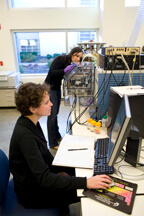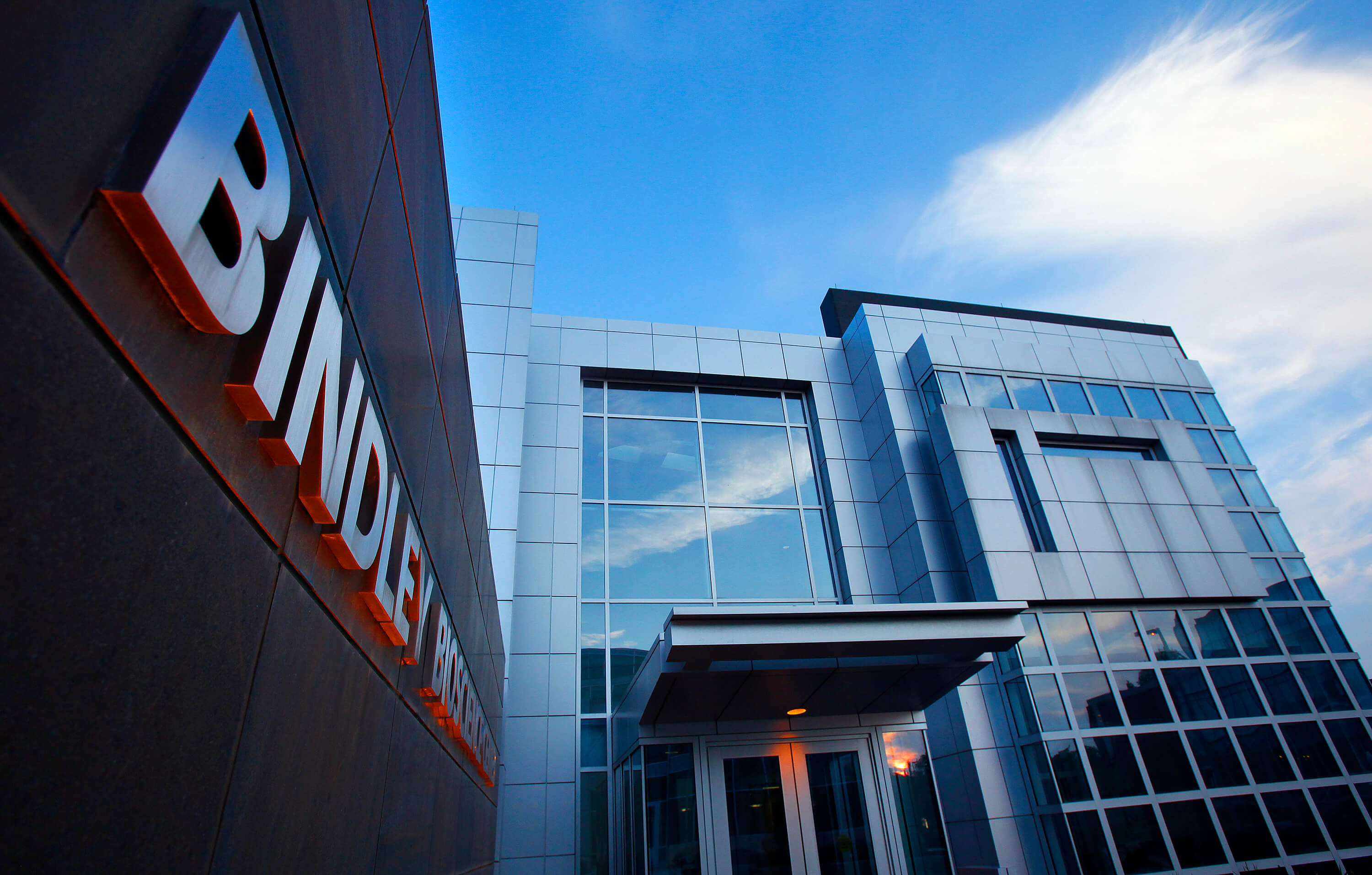Purdue gains $14.9 million in NIH funding to expand Bindley Bioscience Center

Bindley Bioscience Center researchers Allison Dill, in foreground, and Livia Eberlin analyze molecular fingerprint signatures gathered from a miniature mass spectrometer combined with a technique called desorption electrospray ionization, known as DESI. The device and technique, developed by team led by Purdue professor R. Graham Cooks, will be an essential research tool for the planned Multidisciplinary Cancer Research Facility. (Purdue University photo/Vincent Walter)
WEST LAFAYETTE, Ind. - Purdue has received $14.9 million in funding from the National Institutes of Health to expand Discovery Park's Bindley Bioscience Center for growing its cancer and life sciences research.
The NIH's National Center for Research Resources is awarding the money through a federal stimulus measure for the 29,000-square-foot expansion to establish the Multidisciplinary Cancer Research Facility at Purdue. The addition will house investigators from the National Cancer Institute-designated Purdue University Center for Cancer Research to work on innovative animal models of disease, development of new therapeutics and in-vivo animal imaging.
"This major Bindley Bioscience Center expansion addresses a critical need for disease researchers from across multiple disciplines at Purdue," said biology professor Richard Kuhn, director of the Bindley Bioscience Center and head of the Department of Biological Sciences. "This also builds on the university's strengths in cancer research, drug discovery and development, engineering, chemistry and instrumentation, and veterinary medicine with a disease research-focused, multidisciplinary facility for biomedical research."
Thirty to 40 new positions will be created to direct and carry out federally funded research activities at the facility, which will be designed to achieve silver level Leadership in Energy and Environmental Design (LEED) certification, Kuhn said.
Planning and project design for the addition on the south side of the existing building is already under way, Kuhn said. About 165 jobs also will be created during construction, which is expected to begin in August 2011. Completion is tentatively set for April 2013.

The $15 million Bindley Bioscience Center, which first opened to Discovery Park researchers in October 2005, will see its research space grow by 60 percent when the federally funded expansion is completed 2013. (Purdue University photo/Andrew Hancock)
"The expansion will complement the capabilities of Bindley and the Purdue University Center for Cancer Research in biophysical and biomolecular analyses, conventional cell imaging and separation, and high-throughput screening technologies," said Timothy Ratliff, the Robert Wallace Miller Director of the Purdue University Center for Cancer Research. "Laboratories are planned for cancer cell biology, therapeutic and medical device development, cell-based screening, medicinal chemistry, and next-generation imaging."
With Bindley's proximity to the Birck Nanotechnology Center, the addition also broadens Purdue's efforts in nanomedicine, which uses nanotechnology for advancing diagnosis and treatment of cancer and other diseases, Ratliff said.
"This National Institutes of Health funding builds on Purdue and Indiana's success in advancing bio- and life-science research, helping create jobs, and increasing the competitiveness of the state's work force," said Richard O. Buckius, Purdue vice president for research. "A larger Bindley Bioscience Center also helps position Indiana to gain a larger share of $14 billion market for life sciences research and development, an industry segment that's growing 15 percent a year."
Bindley Bioscience Center is named for 1962 Purdue graduate William E. Bindley, who in 2002 contributed $52.5 million to the university. Bindley designated $7.5 million of his gift to cover half the cost of the two-story, 50,000-square-foot research facility, with the rest funded by earnings from unrestricted endowments. The center opened to researchers in October 2005.
Lilly Endowment Inc. provided $50 million to launch Discovery Park, which has grown into a $500 million interdisciplinary research complex for large-scale projects. An arm of Purdue's research enterprise, Discovery Park brings scientists, researchers, engineers and management experts together to make basic discoveries available to advance Indiana's economy and solve societal problems by developing new products and processes.
The Purdue University Center for Cancer Research, one of only seven basic science NCI-designated cancer centers, will begin its 32nd year of NCI funding in July 2010.
Writer: Phillip Fiorini, 765-496-3133, pfiorini@purdue.edu
Sources: Richard Kuhn, 765-494-4407, kuhnr@purdue.edu
Timothy Ratliff, 765-494-9129, tlratliff@purdue.edu
Richard Buckius, 765-494-6209, rbuckius@purdue.edu
